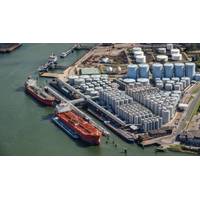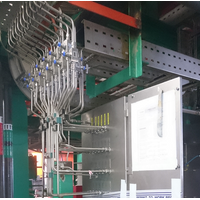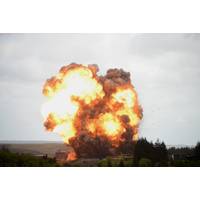Nippon Foundation, DeepStar Launch Joint Decarbonization R&D Program

The Nippon Foundation signed a Memorandum of Understanding (MoU) with the offshore technology development consortium DeepStar to establish a joint research and development program focused on decarbonization in offshore oil and gas, with a focus on renewable energy and the environment.The initial program budget is up to $10 million through 2026, and the overall plan is to develop technologies for commercialization.“I am very pleased that we have been able to conclude this new memorandum of understanding,” said Mr. Sasakawa.
HazSub Spill Response Plans

On August 18, 1990, the Oil Pollution Act of 1990 (OPA 90) was enacted into law. Section 4202 of that Act amended the Federal Water Pollution Control Act (FWPCA or Clean Water Act) to require tank vessels and marine transportation-related facilities to prepare and submit to the US Coast Guard plans for responding, to the maximum extent practicable, to a worse case discharge, and to a substantial threat of such a discharge, of oil or a hazardous substance carried in bulk as cargo. The only real difference between the requirements regarding oil and hazardous substances was that a hard deadline was mandated for oil spill response plans…
Offshore Gas Safety atop the Agenda for Martek Marine

Maritime industry technology specialists Martek Marine say it is setting the bar high when it comes to offshore gas safety. The company has developed a first-of-its-kind gas sampling system for a new moored floating production unit, which forms part of the Jangkrik Complex gas fields development in Indonesia. The system has been developed to dramatically improve offshore crew safety through the use of advanced gas sampling technology. The worst offshore disaster in history, the Piper disaster on July 6, 1988, involved a series of gas explosions which destroyed the Piper Alpha oil platform in the North Sea, killing 167 men.
DNV GL to Open Explosion Test Site in the UK

DNV GL, a technical advisor to the global oil and gas industry, is building a new conference center and large-scale fire and explosion demonstration area at their unique major hazard testing and research center in Cumbria, U.K. The new training facility, which aims to enhance experiential learning for the oil and gas, chemical and security industries, is due to be completed in December 2015. The testing and research center is the largest facility of its kind in the U.K. and features some of the world's most advanced destructive and nondestructive test facilities, DNV GL said.
Alliance Shuts Natgas Pipeline; Chicago Prices Up
Alliance Pipeline shut its Western Canadian 1.6 bcfd pipeline that feeds natural gas to Chicago on Friday after poisonous, flammable gas got into the system, forcing at least five producers to curb output and lifting Chicago prices. The company declared force majeure on the 2,400-mile (3,850- km) pipeline, which delivers gas from Western Canada and North Dakota's Williston Basin to the Chicago market. It accounts for about a third of Canada's daily net exports to the United States. It did not give an estimate for when it would restart.
France Firm to Revive Domestic Gas Production
European Gas Ltd changes name to Française de l'Energie; expects to start marketing gas in 2017. France could get the equivalent of 10 years of gas consumption by exploiting the methane trapped in the former coal mines of its deprived eastern regions, a French company running a rare domestic exploration programme said on Wednesday. France, which slammed the door on developing shale gas due to environmental concerns and blocked many exploration permits, has discretely supported efforts by Française de l'Energie, based in the Lorraine region, to exploit so-called coalbed methane.
Highest OTC Award for Petrobras
For the third time, Petrobras is set to receive the highest award that an oil company can be given, bestowed by the Offshore Technology Conference (OTC) committee, based in Houston, USA. The OTC Distinguished Achievement Award for Companies, Organizations, and Institutions provides recognition for the set of technologies developed for oil and gas production in the pre-salt layer off the Brazilian coast, where the company achieved a new daily production record on December 21, 2014, extracting 713,000 barrels of oil. The awards ceremony will take place in May in Houston.
Study: Bakken Crude Safe for Rail Transport
The North Dakota Petroleum Council is set to release a study later this month adding to the number of industry voices concluding that Bakken crude oil is safe to move by rail because it is no more flammable than other crude grades. The study will show that Bakken crude is not more flammable or volatile during rail transportation than benchmark West Texas Intermediate, Kari Cutting, vice president of the council, said on Thursday during the Crude Oil Quality Association conference in Denver. The council represents more than 500 companies in the oil and gas industry.
Tougher Rules Not Needed For N. Dakota Oil-By-Rail Cargo
Crude oil from North Dakota's energy patch should not be subject to tougher regulations because the cargo is no different than other crude oil, an industry trade group said on Tuesday. After a series of train derailments and fiery explosions involving crude originating from North Dakota's Bakken fields, U.S. officials have warned that Bakken crude could be more volatile than crude oil from other regions. Even rail industry officials have said the crude is more akin to flammable gas. But the oil industry has pushed back…
North Dakota Fuel Does Not Need Special Handling
Despite some fiery mishaps involving fuel from North Dakota's Bakken energy patch, cargo from the region does not need special handling when it moves on the tracks, the leading voice for U.S. refiners said on Wednesday. The American Fuel & Petrochemical Manufacturers (AFPM), the trade group for the country's refiners, funded a third-party study of Bakken fuel that concludes the product is being handled properly. "Bakken crude is as safe to transport as other crude oils and is well within the safety standards for current rail car designs," said Charles Drevna, the president of the trade group.
